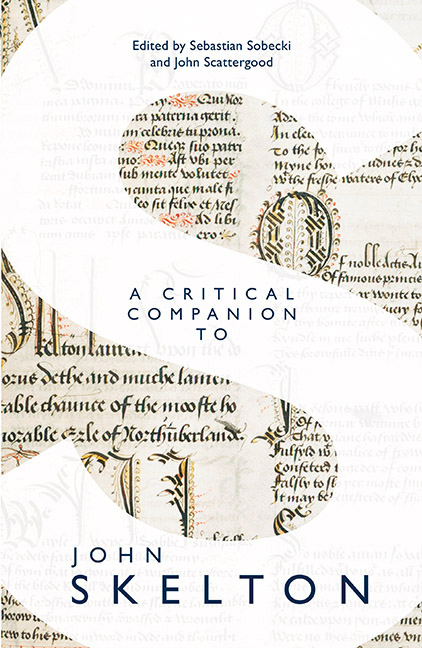Book contents
- Frontmatter
- Dedication
- Contents
- Acknowledgements
- Contributors
- Abbreviations
- Conventions
- Introduction
- 1 John Skelton (?1460–1529): A Life in Writing
- 2 Religion
- 3 Law and Politics
- 4 Classical Literature
- 5 Humanism
- 6 Satires and Invectives
- 7 Lyrics and Short Poems
- 8 Skelton's Voice and Performance
- 9 Literary Tradition
- 10 Skelton and the English Language
- 11 Skelton's English Works in Manuscripts and Print
- 12 Skelton's English Canon
- 13 Reception and Afterlife
- A Skelton Bibliography
- Index of Manuscripts
- Index of Printers and Stationers
- General Index
1 - John Skelton (?1460–1529): A Life in Writing
Published online by Cambridge University Press: 24 July 2019
- Frontmatter
- Dedication
- Contents
- Acknowledgements
- Contributors
- Abbreviations
- Conventions
- Introduction
- 1 John Skelton (?1460–1529): A Life in Writing
- 2 Religion
- 3 Law and Politics
- 4 Classical Literature
- 5 Humanism
- 6 Satires and Invectives
- 7 Lyrics and Short Poems
- 8 Skelton's Voice and Performance
- 9 Literary Tradition
- 10 Skelton and the English Language
- 11 Skelton's English Works in Manuscripts and Print
- 12 Skelton's English Canon
- 13 Reception and Afterlife
- A Skelton Bibliography
- Index of Manuscripts
- Index of Printers and Stationers
- General Index
Summary
In a judgment which has been much admired and widely endorsed C. S. Lewis wrote of John Skelton: ‘He has no real predecessors and no important disciples; he stands out of the streamy historical process, an unmistakable individual’ (Lewis 1954: 134). His writings are highly distinctive and individualistic, but most of what is known factually about Skelton as an individual comes from official records. These tell what universities he attended and what degrees he received, what positions he held in the Church and at court, what he was paid, where he lived for some of the time, what legal cases, both ecclesiastical and civil, he was involved in, when he died and where he was buried (Edwards 1949: 287–304). We know that some of his contemporaries admired him and that he quarrelled with others. We also know who owned some of the manuscripts in which some of his works were copied and who printed others (Kinsman and Yonge 1967: 1–80). There is a collection of fifteen amusing stories about him – the so-called Merie Tales of Master Skelton (1567) – but these, for the most part, were not current in his lifetime and have not been found to be entirely reliable, though they do indicate how he was perceived by some, and provide hints about his lifestyle (Dyce 1844: I, pp. lxxi–xci, nos. i–xv). In fact, the most valuable information about Skelton's attitudes, his likes and dislikes, his political preferences and how, generally, he reacted to the world in which he lived is provided by his writings themselves. So it is possible to trace the contours of Skelton's peripatetic, somewhat erratic and very controversial career with a fair degree of confidence (Edwards 1949; Gray 2012: 3–99; Nelson 1939; Pollet 1971; Scattergood 2004; Scattergood 2014).
John Skelton is usually thought to have been born around 1460 or a little later, probably of a northern, possibly a Yorkshire, family (Pollet 1971: 6–9; Scattergood 2014: 53–4), though Greg Waite has argued, on the basis of some dialectal features of Skelton's language, that ‘both his origins and schooling’ may have been in ‘East Anglia or the Central to NE Midlands’ (Waite 2008: 128).
- Type
- Chapter
- Information
- A Critical Companion to John Skelton , pp. 5 - 25Publisher: Boydell & BrewerPrint publication year: 2018



